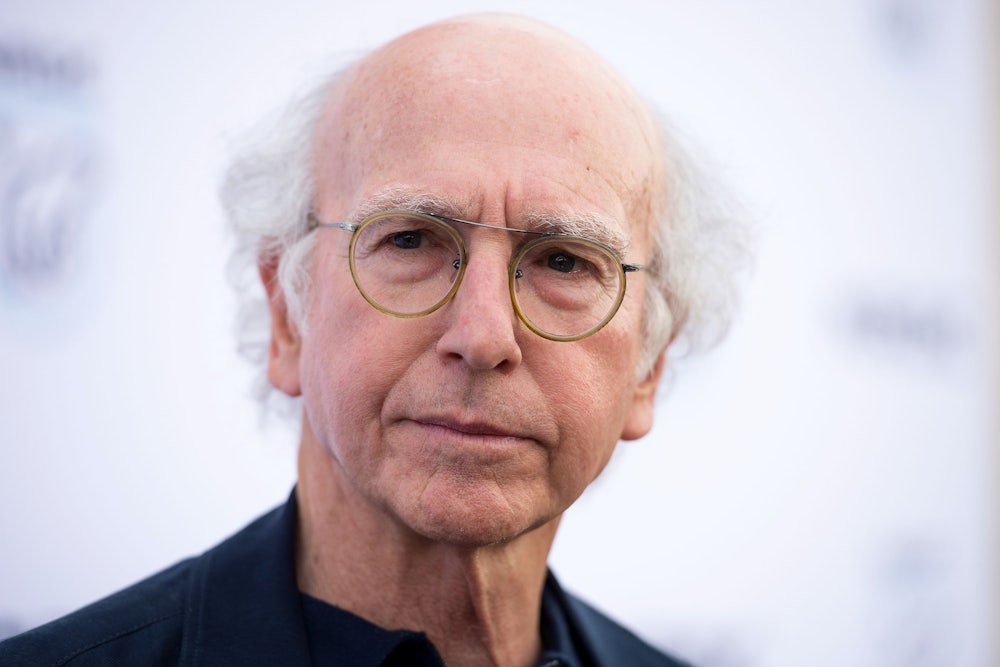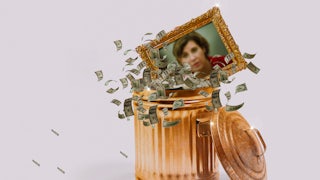Larry David appeared in a Super Bowl ad on Sunday. It was extremely funny. It showed David in various period costumes pooh-poohing a succession of transformative innovations: the wheel, the fork, the toilet, the Declaration of Independence, the light bulb, the moon shot, portable music.
But the punch line wasn’t funny at all. In modern dress, David demonstrated similar skepticism sitting across a desk from a man who told him that FTX, a new cryptocurrency exchange, was “a safe and easy way to get into crypto.” “Eeeh, I don’t think so,” David answered. “And I’m never wrong about this stuff. Never.”
David is not only a well-known comic actor but also a well-known Hollywood liberal. Last summer, he was reported by The New York Post to have screamed self-righteously at Alan Dershowitz in the Chilmark General Store on Martha’s Vineyard: “I saw you with your arm around [former Trump Secretary of State Mike] Pompeo! It’s disgusting!” But unless FTX’s business model includes reimbursing investors for every loss while allowing them to keep every gain, which I very much doubt, David was lending his name to a financial proposition likely to visit misery on many and possibly most of his target audience. David was telling the Super Bowl’s mass viewership that it would be foolish not to put your money into cryptocurrency, when the reality is that for the overwhelming majority, doing so is a very dangerous proposition.
Writing in Slate in October, Ben McKenzie and The New Republic’s Jacob Silverman, who are writing a book about crypto and fraud, concluded, “The Hollywoodization of crypto is a moral disaster.” It’s only gotten worse since then. I don’t travel to Martha’s Vineyard very often, but I’m tempted to fly up there this summer just to visit the Chilmark General Store and scream at Larry David: “I saw you peddling risky financial investments to the working class. That’s a lot more disgusting than putting an arm around Mike Pompeo!”
Crypto has created an epidemic either of unconscionable greed or of ethical obtuseness—probably both—among Hollywood liberals and other celebrities. Matt Damon, who on the eve of the 2016 election said, “There’s no way we can let this guy [Trump] be president,” last year cut an ad for crypto.com that was similarly themed to David’s. “History is filled with almosts,” Damon intoned:
With those who almost adventured. Who almost achieved. But ultimately, for them it proved to be too much.
Then there are others. The ones who embrace the moment and commit. And in these moments of truth, these men and women—these mere mortals just like you and me—as they peer over the edge, they calm their minds, and steel their nerves, with four simple words that have been whispered by the intrepid since the time of the Romans. “Fortune favors the brave.”
Just like you and me. Unless you possess a net worth of $170 million, as Damon reportedly does, you are not, dear viewer, “just like” this gifted actor, and if you want to stay solvent, never presume that you are.
Before Damon dropped out of Harvard to pursue a burgeoning acting career, he roomed with Jason Furman, who went on to become chairman of President Barack Obama’s Council of Economic Advisers and now teaches economics at Harvard. The two roommates have remained friends over the years, and I couldn’t resist asking Furman (who is also—full disclosure—a friend of mine) whether Damon consulted with him in advance about the advisability of turning crypto pitchman. If so, what did Furman tell Damon? If not, what’s Furman’s opinion?
“Sorry, nothing for you on this one,” Furman emailed back. “You can find my general views on crypto on my Twitter feed.”
Furman’s general views are not favorable.
In November, then-Mayor-elect Eric Adams of New York City said on Twitter that he would take his first three payments in Bitcoin. Furman was unimpressed by this celebrity endorsement, calling it “a bad economic strategy for NYC and a bad investment decision.” If crypto was a bad investment decision for Adams, one can only imagine how terrible an investment decision Furman thought it would be for the average television viewer.
Furman has also tweeted that he favors more regulatory oversight of the crypto industry and that he harbors suspicion of its resistance to such oversight. “The crypto industry claims that if they were subject to basic tax compliance measures they would cease to exist,” Furman tweeted in August. “What does that say about the desirability of the existence of the industry?”
Of course, you don’t have to be the Aetna Professor of the Practice of Economic Policy to intuit that “fortune favors the brave” is catastrophically bad investment advice to anybody who can’t afford to lose a great deal of money. A broker who said such a thing to an ordinary client would be begging that client to report him to the Financial Industry Regulatory Authority, the nongovernmental organization that oversees securities firms. For the record, what your broker is supposed to say is: “This is a safe and properly balanced investment portfolio for someone at your income level and stage of life.”
The Lakers’ LeBron James is another celebrity liberal. He helped create an organization, More Than a Vote, to fight voter disenfranchisement, which was a great thing to do with his celebrity wealth. Less great is that James added to that wealth on Sunday by starring in a Crypto.com Super Bowl ad that bore the same odious slogan as Damon’s, “Fortune favors the brave.” Shame on him.
Reese Witherspoon is another Hollywood celebrity who’s urged the masses to put their life savings into cryptocurrency. As a child she dreamed of being the first woman president, and when People asked her two years ago whether she’d consider running for office, she said, “I wouldn’t say never.” She’s a champion of women’s rights and greater representation in government of women and people of color. But Witherspoon doesn’t appear to care whether America’s middle class loses its shirt on crypto, which she’s been hawking on Twitter.
In Witherspoon’s case, it isn’t clear that anybody’s paying her to do this. If she isn’t getting paid, then she’s an even bigger fool than I’ve guessed.
After Witherspoon urged her Twitter followers to invest in crypto (“Avatars, crypto wallets, digital goods will be the norm. Are you planning for this?”), she sent a follow-up tweet seeking advice on “the most sustainable crypto currencies.” It wasn’t entirely clear whether Witherspoon meant sustainability in the financial sense or the environmental one, but for the record, cryptocurrency is a minor catastrophe for the planet. You’ve probably heard that computer “mining” of Bitcoin consumes, worldwide, 125 terawatts per year, which is equivalent to the total domestic energy consumption of Argentina. “It is estimated,” Kelly Derham of the Pennsylvania Sierra Club says, “that in 30 years Bitcoin could alone increase global temperatures 2 degrees Celsius.” Even if Hollywood liberals can get away with not caring about the economic fragility of the lower orders, they’re expected to care about climate change. Oops.
The potential harm from David, Damon, James, and Witherspoon is not confined to the individual suckers whom they persuade to carpe diem with their life savings. They may also be playing havoc with the whole economy. In The Los Angeles Times, reporter Ryan Faughnder wrote that financial analysts see parallels between crypto and the dot-com bubble. “That earlier hype cycle,” he wrote, “reached a pop culture apex at the 2000 Super Bowl. That game featured ads by companies like Pets.com, which quickly collapsed.”
One possible sign of broader economic danger is that some in the cryptocurrency industry are starting to pour cold water on celebrity endorsements. Binance, the world’s largest crypto exchange, last week posted a video on Twitter starring Miami Heat star basketball player Jimmy Butler. “On February 13,” Butler said, “you’re gonna hear some of the biggest names telling you to get into crypto. But they don’t know you, or your finances. Only you do. Binance and I are here to tell you trust yourself, and of course do your own research.”
Probably Binance had selfish competitive reasons to pooh-pooh the Super Bowl ads for crypto. Better still would have been if Butler had said, “You really shouldn’t put your money into crypto unless you can easily afford to lose every last penny you invest. Which means about 95 percent of you shouldn’t even consider it.”
But I guess that would risk a crash too. What’s infuriating is that it’s liberals, of all people, who got us into this fix. Lord save liberalism from its Hollywood chapter.








